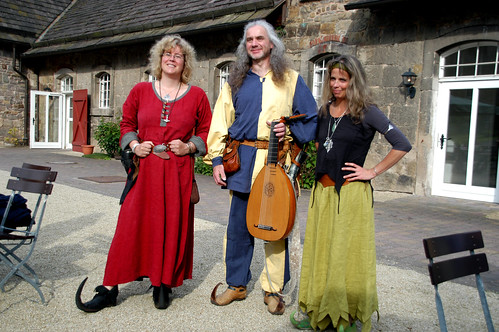
I’m an old dog: it’s hard to teach me new tricks. For example, take a recent 4e character I made. Lute playing is a huge part of my character concept, and I instinctively wanted to quantify his lute-playing expertise as a stat. But it turns out there’s no spot on the character sheet for musical instrument playing! Surprisingly performance hasn’t come up in the past 3 years in my game other than acrobatic stunts, so I haven’t noticed it until today.
We’ve come a long way since non-weapon proficiencies and my inner player says this is a good thing. But I thought I’d give some rule suggestions for those who want to make a roll for their strumming.
Charisma Check. My first thought is to set a DC based upon the audience and what the goal is. Lulling an angry Gnoll mob to sleep is a high DC. Trying to earn a few coins by playing drinking songs in a friendly bar– easy DC. Let the player make a Charisma check + 1/2 level. Let him add in a +2 equipment bonus if he’s playing a masterwork instrument (however you want to define it).
Substitute Skills. One of the great thing about D&D skills is that you can creatively argue for the use of any particular skill in just about any situation. Looking at the desired outcome of the performance and the character’s way of achieving it helps decide what skill to use. Endurance can substitute for marathon playing or dueling banjos (or fiddles). Insight can help your musician choose the appropriate tune for the job. Bluff would be good for sight-reading, faking a tune, or trying to play above one’s level. Acrobatics can add a bit of showmanship to the performance, or help the character totally shred out like Eddie van Halen. Heck, why not use Heal if the character is playing to lighten the mood or make a princess swoon.
Skill Challenge. When I posed this question on twitter, boss DMSamuel, described how he made it into a whole skill challenge by breaking down a performance into several pieces: dancing on the tables, swinging on chandeliers, knife throwing, and joke telling. Basically instead of summarizing a night of troubadouring as just playing one song, break it out into several scenes of a performance. This is a good chance to give the spotlight to the character for a whole scene (although the person playing the Bard usually gets a lot of the spotlight already). This is also a chance to bring the rest of the party into the performance. One character can sing a bawdy song, while another tells jokes, and a third pickpockets the crowd. As a mini-skill challenge, failures can indicate slip-ups in playing (causing the Rock meter to go into the red), audience members leaving, or a lessening of the performance’s effect.
Hand Waving. The 4e designers left perform off the skill for a reason, and maybe that’s because the aspects that make D&D interesting for most players don’t overlap with rolling musical instrument skills. There’s not really a need for a character to have a stat just to play a musical instrument. If a player wants his character to be good at an instrument, let him. He can automatically earn a few gold or impress the court. As long as the outcome doesn’t unbalance encounters or challenges, what’s the harm?
Weave it Into the Story. Rather than just give just letting a song happen and move on, make it a diceless role-playing activity. Have the player explain what he’s trying to accomplish with the performance, and then decide the effect. If a player has made music playing an important part of his character, he wants the opportunity to use it. So give them a chance to build something cool with it. Even if they ask for a big effect, if they can justify it, go with it.

I agree. Perform should be there, but at the same time, like you say, substuting a different skill for it usually works. I actually usually do Perform like Diplomacy as most performances by my guitar wielding sniper in my current D&D 4e game have been in an attempt to win over a crowd – so, he uses his diplomacy rating, which works ok.